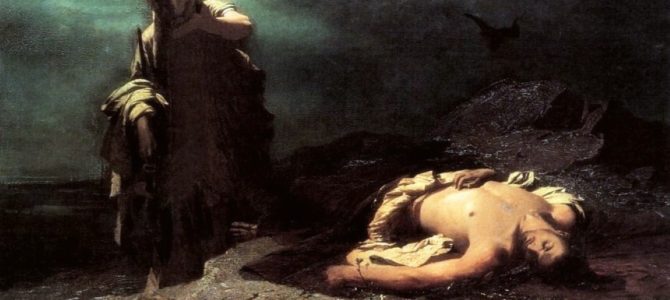
Considering that they are perhaps the most privileged population in the history of the world, it seems ironic that American young people today have taken to fighting a system that has bequeathed this very privilege.
Many grow up in safe neighborhoods and never have to worry about becoming the victims of injustice, yet they insist that social injustices exist all around them. Furthermore, many never realize how their violent protesting, calls for defunding the police, and glorification of hardened criminals all do great harm to the victims they claim to champion.
Clearly, the problem isn’t material, but spiritual. While many writers have already argued young people have imbibed leftist ideals from a captured culture, it could also be argued that they have imbibed no ideals at all. Behind the rallying cries of social justice, there lurks a profound emptiness and a desire for anarchy that helps explain why contradictions and strife seem to abound in social justice movements.
Oddly enough, perhaps the best explanation of this phenomenon can be found in one of the oldest works of literature: Sophocles’s “Antigone.”
A Struggle for Power
Far from evoking the usual fear of the gods and pity for doomed nobility, in the style of most Greek tragedies, “Antigone” explores the psychology behind two complex characters, one whose despair drives her to threaten the social order and the other who must respond accordingly.
The events of the play come after those of “Oedipus Rex” and “Oedipus at Colonus.” The city of Thebes is recovering from an attack led by one of Oedipus’s sons, Polynices, who hoped to take the kingdom from his brother, Eteocles, who defends the city. The battle leaves both princes dead, resulting in their uncle Creon becoming the new king.
Creon’s first law is to prohibit the burial of any enemy who attacked Thebes, including his nephew. His reasoning is clear: justice demands that patriots are buried with honors and traitors are punished by being left to rot without burial. Creon’s niece, Antigone, who is the sister of Polynices and Eteocles, immediately defies the order and buries her traitorous brother. Angered by this action along with Antigone’s words that denounce Creon’s cruelty, he sentences her to death.
Eventually, Creon changes his policy about burial when the famous prophet Tiresias tells him the gods are displeased. Unfortunately, Creon reacts too late to reverse the punishment of the gods. This precipitates the multiple tragic deaths in the final moments of the play.
First, Antigone hangs herself before Creon can save her. Then, Creon’s son Haemon, who was engaged to Antigone, curses his father and kills himself. Hearing of her son’s death, Creon’s wife Eurydice commits suicide as well. As if this weren’t enough, Tiresias informs Creon that Thebes will be attacked again soon.
On the surface, Antigone seems like a martyr protesting an unjust law while Creon is a petty dictator abusing his power. Antigone represents the righteous protester while Creon represents the corrupt state. Such is the interpretation given by writer Joseph Pearce in his summary of the play. Below the surface, however, it’s vastly more complicated.
Chaos, Order, and Friendship
To begin, although Antigone assures Creon her motives satisfy the will of the gods, it’s not her place to assert this. She is no more a religious authority than Creon is. Only Tiresias can speak for the gods, and, as is his inclination, he comes in too late to change what happened.
Rather, Antigone mainly seems to use religion as a pretext for acting out destructive impulses based on despair. Except for her cowardly sister Ismene, she has lost everyone in her family, and all died in gruesome fashions. Coupled with every reminder of what is due to the gods is the reminder of how miserable she is:
Can anyone living, as I live, with evil all about me, think Death less than a friend?
When Ismene reminds her of what her death would mean to her and others, Antigone responds gloomily, “It is the dead, not the living, who make the longest demands: We die forever.” This admission not only suggests the nihilism animating Antigone, but also the culture of death fostered by Greek paganism. It’s a far cry from the morality and logic of Christianity.
Instead, it is Creon, the supposed villain, who advocates morality and logic and consequently runs afoul of the gods. As he assumes the throne, it falls upon him to clean up the mess of Polynices. This challenge inspires him to make his decree:
No one values friendship more highly than I; but we must remember that friends made at the risk of wrecking our ship are not real friends at all.
Creon has to find a way to reward those who defended Thebes and punish those who attacked. He cannot hope in divine justice doing this work for him. The only choice Creon has is to deny burial, and thus deny honor and endorsement of those who betrayed their home. While it may seem futile to punish those already dead, as Tiresias and Antigone both point out, the symbolism is key to rebuilding Thebes.
If Creon lets bygones be bygones and refuses to denounce and dishonor the city’s enemies, then the cycle will continue again. Justice demands that virtue be rewarded and evil punished; indeed, when justice is subverted or ignored, civilization crumbles and decline ensues.
When the tragedy is framed in this way, Antigone symbolizes chaos while Creon symbolizes order. Sophocles does not indicate whether one is good or bad — is Antigone or Creon the tragic hero? — but depicts these two forces hopelessly negating one another in a fatalistic cycle.
Is the Goal Truth, or Destruction?
So where does this leave people today, who have a whole generation of Antigones to deal with? Are they doomed like Creon to suffer either way?
Fortunately, circumstances have changed in the modern world that allows people a way out of Creon’s dilemma. Staging a coup d’etat with the aid of foreign armies isn’t as feasible today as it was in Ancient Greece, and there are better options for punishing enemies and honoring patriots than burying one group and not the other.
With that said, people today should call the bluff of radicals attempting to mask anarchism with lofty rhetoric of social justice. Like Antigone, they are materially provided for, but lack love and guidance in their lives, making them vulnerable to cheap slogans and narratives. Like Antigone, they assume the moral high ground, but they’re actually oversimplifying complex issues and looking for a scapegoat. Truth isn’t the goal, destruction is.
Instead of showing strength, political and cultural leaders typically fall over backward apologizing and making excuses. They believe doing anything else will only aggravate the issue. As Antigone demonstrates in her desire for death, no response will change a young radical’s mind from oblivion, at least not in the short term. They must first be contained and disarmed. Only after that happens can society address the deeper problems.
Addressing such problems is a long and involved process. Not only does it involve cultivating domestic stability, but it also involves teaching people how to be happy. Young radicals need more family in their lives who will empower them, not more things that enable them. They need to learn how to live, or they will only learn how to die.
This is why Antigone acts the way she does. She has no family or friends, and the only fulfillment she can fathom is an honorable death:
Leave me my foolish plan: I am not afraid of the danger; if it means death, it will not be the worst of deaths — death without honor.
At most, her death will bring awareness of Creon’s mistake, whereas she could have worked to help Creon change his mind and rebuild Thebes. For some reason, this second option never occurs to her or anyone else.
Aristotle said that art imitates life, and we see it today in “Antigone.” As the Christian culture recedes, society has gradually assumed a pagan ethic committed to dismantling all forms of order. How society chooses to respond will define the culture and determine whether life will start imitating art (as Oscar Wilde suggested) and people end up living in a tragedy.









